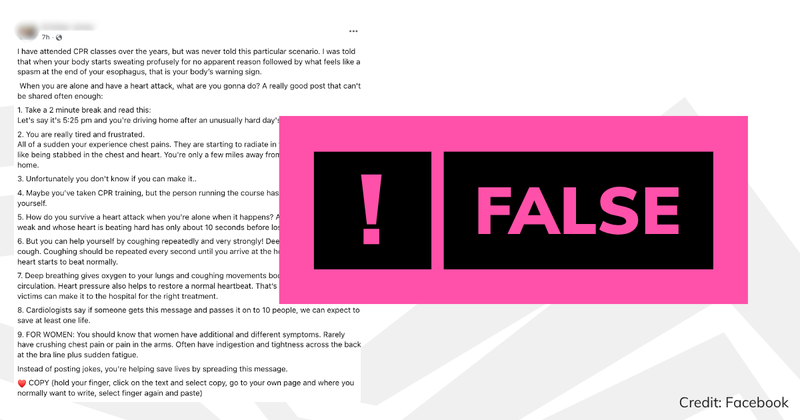Posts being shared on Facebook incorrectly claim that coughing really hard can help save someone’s life if they’re having a heart attack when they’re alone.
However coughing does not protect an individual from a heart attack, and these social media posts do not contain good medical advice. If someone believes they, or someone else, is having a heart attack, they should immediately call the emergency services at 999.
We’ve seen claims like this several times before. As we’ve previously explained, the myth that coughing can help people during heart attacks, which is sometimes described as “cough CPR”, has been circulating since at least 1999.
The British Heart Foundation has said “Cough CPR is a dangerous myth”, and that there’s “no medical evidence to support ‘cough CPR’”, while in 2021 a University of Warwick study of alternative methods of CPR found “cough CPR” offered “no benefit in saving lives”. The University of Warwick also noted that it was a “misnomer as it does not involve CPR”.
The Resuscitation Council UK has previously said it is “concerned by such incorrect ‘advice’”.
Where did the claim come from?
The posts claim coughing “repeatedly and really hard” can help individuals as “deep breathing gives oxygen to your lungs and cough movements increase your heart and blood circulation”.
As we’ve said previously, the Resuscitation Council UK says this myth is likely “very loosely” based on some academic case reports of people who were able to maintain a regular heartbeat while coughing after developing an arrhythmia (an irregular or abnormal heartbeat)—but crucially, this happened during treatment in hospital and under medical supervision.
Heart attack, arrhythmia or cardiac arrest?
Heart attacks, cardiac arrest and arrhythmia are different things, although a heart attack or arrhythmia can result in cardiac arrest.
In a sudden cardiac arrest, the heart suddenly stops pumping blood around the body, and the person will collapse and stop breathing.
CPR is recommended in this instance (after 999 has been called).
You can read the British Heart Foundation’s advice about how to do CPR here.
However CPR is not recommended for a heart attack, which happens when the supply of blood to the heart is blocked (usually by a blood clot).
Symptoms of a heart attack can include chest pain, nausea and shortness of breath. People who suspect they, or someone else, is having a heart attack should call 999 and ask for an ambulance. The NHS says it may also help to chew and swallow aspirin (as long as they are not allergic to it), while hospital treatment can include surgery or specific medicines.
A cardiac arrest can happen in the advanced stages of a heart attack, but this isn’t its only cause.
Treatment for arrhythmia varies depending on its severity.
False information can spread widely on social media and may be harmful if people use it to make decisions about their health.
In this case, people might delay treatment or make their condition worse while trying to follow this bad advice.
